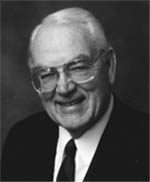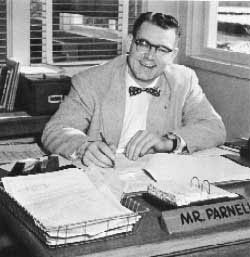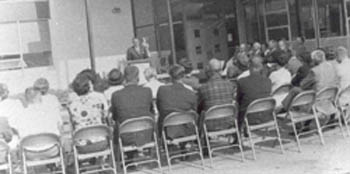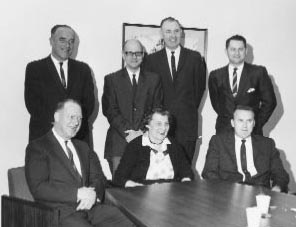Oral History - Dale Parnell

Dale Parnell, 1991
|
Dale Parnell was instrumental in founding Lane Community College. He served as its first president, 1965-1968.
In an oral history interview on September 24, 2003, Dr. Parnell talked about his role in establishing the college, the mission of community colleges, and his career as an advocate of community colleges in Oregon and Washington, D.C.
To listen to the complete recorded interview, contact the college archivist or click on the links below.
Excerpts from his interview are printed below.
 Listen to a recording of Part 1 (mp3; 44:31 minutes, 40.7 MB) Listen to a recording of Part 1 (mp3; 44:31 minutes, 40.7 MB)
 Listen to a recording of Part 2 (mp3; 16:52 minutes, 15.4 MB) Listen to a recording of Part 2 (mp3; 16:52 minutes, 15.4 MB)
From Vocational School to Community College
I started really thinking about the community college idea and reading about it when I was principal at Springfield High School. ... I was thinking a lot about some of the unsung heroes in helping to start Lane. One of the people I immediately thought of was Bill Cox who was the director of the Eugene Technical-Vocational School. And I kept trying to get some of our Springfield High School students into Eugene Voc-Tech. They didn't have room. And after a while, talking with Bill, I said, how can we expand what you are doing – because it was just the Eugene school district. And he said, well, we could always make it a county-wide institution. At that time we were thinking about taking the Eugene Vocational-Technical School and going county-wide with it. Broadening the program some. But the more I read and the more I thought about it, the more I thought, well, why don't we convert it to a community college.

Dale Parnell,
Principal of Springfield High School,
early 1960s |
.. That was my early thinking on it and Bill Cox agreed with it. And when I became county school superintendent, immediately, oh, within a year or so, I approached the superintendents in the various school districts in the county with the idea of converting the Eugene Vocational-Technical School to a community college, to a county-wide community college. And that was the initial discussion.
The Neglected Majority
I thought there needs to be some kind of post-secondary institution that will help kids. I wrote a book in 1984 called “The Neglected Majority” and that whole great group of students that are not likely to earn a baccalaureate degree, although some might. Even the 2000 census indicates that 26% of the adult population in the country hold a baccalaureate degree or more. That means 74% do not. And we've never in the history of the country until the community college movement began to blossom paid much attention to that 74%. And even though in some communities it might be higher than that, but even, let's say, it were 30% that held baccalaureate degrees, that would still mean 70% do not. Well, what's for them? Don't they need a better education than they're getting in a post-secondary opportunity? Some might go on to get a baccalaureate degree if they were encouraged. But an awful lot of them needed technical education of one kind or another.
State Support for Community Colleges
I had talked with then our governor Mark Hatfield - in those early days he didn't know much about community colleges - and tried to enlist his support for establishing community colleges. And he at first was kind of leary of the idea, mainly because of budget - finance problems. Well, how would we pay for this? And on the idea of a “neglected majority,” he finally came around. And they authorized a position in the State Department of Education...so there was somebody at the state level who was putting some emphasis on the community college. ... And Leon Minear was the State Superintendent at the time and he gave it his full support. So with Mark Hatfield's help, with the Legislature. And, of course, Tom McCall was totally supportive of Lane. He named me to be the State School Superintendent [in 1968] and we were still developing community colleges at that time. And he was totally supportive. So you needed that state level leadership as well as the local leadership.
The 'Within Reach' Philosophy
 Within Reach Philosophy (MP3, 3:01 min, 3.45 MB.) Within Reach Philosophy (MP3, 3:01 min, 3.45 MB.)
So we started what I called the sales pitch to get people to vote in favor of the converting the Eugene Tech to an area-wide community college. We called it the “within reach” theme.
To be within reach geographically. We wanted in the early days - I don't know if Lane still does this – if they lived more than 25 miles or 30 miles we gave them a discount on their tuition – the mileage incentive. But we wanted to be within reach geographically.
We wanted to be within reach financially. That's why low tuition has always been a hallmark of my belief about community colleges. Keep the tuition as low as we can keep it so that it stays within reach of most of the people. I don't want to insinuate that we are all things to all people. I don't think the community college can ever do that. But we can be a lot of things for a lot of people if we keep it within reach. Within reach financially.
Within reach psychologically. We don't talk much about that. What does it mean to be a number rather than a personalized name when you walk into a classroom? I wanted the community college to be as friendly a place as we could possibly make it. And be a caring kind of institution. So that students when they came here, regardless of their ethnic background, regardless of their gender, regardless of their status in life, would feel like this institution really cared about them. And that means caring at the Business Office window, caring at the Personnel Office window, caring in the classroom. Be a caring kind of institution. And that's what I mean by being psychologically within reach. We don't pay enough attention to that in education generally, but particularly in higher education.
And I wanted to be within reach academically. Not that we lower the standard - didn't want the standards to be lowered - but to have programs that meet the needs of people of all levels. That's why vocational-technical education has always been so important to me. Who in the world is going to keep our trains tracking, and our water running, and all of the fundamentals of American life if we don't have trained people. And it's becoming more complicated all the time. Well, that's the great role, one of the roles for the community college. Well, of course, helping people get started and transfer to the university is another great role.
That's what I mean about being within reach academically - having programs that meet the needs of a whole host of people who come to us. Believe me, if there's any bit of diversity in this country it's in the community college. We find probably more diversity in the community college than in any part of education. Because we get people of all walks of life and all ethnic backgrounds, and so forth.
That's the “within reach” philosophy in the early days, and I still think that's a solid philosophy
Shared Governance

Dale Parnell speaking at the opening ceremony for
Lane Community College, July 1, 1965.
|
When we started Lane we started with shared governance almost out of desperation because we were trying to get up and running so fast. The first year – we started on July 1st of 1965 – and that fall we had something like seventeen – eighteen hundred students right off the bat.
We were holding classes in an old elementary school out in the Bethel School District, in the old Georgia-Pacific building in Springfield, all over the place. And trying to keep that all running we needed to make sure that everybody pitched in and helped. And so we had shared governance from day one. Because we couldn't run this place, we couldn't have gotten it done. Anybody who thinks that one person or two persons or a small group are going to start a community college is crazy. We had to have broad and wide participation in almost all of the events of the college.
First Board of Education

Charter Board of Directors, 1964
Left to right, standing: Ken Schmidt,
Bill Bristow, Cliff Matson,
Al Brauer; sitting: Lyle Swetland,
Olga Freeman, Dean Webb.
|
That early Board - I give them a lot of credit, because none of them had had experience with a community college. I know they consulted some with Arthur Flemming (president of the University of Oregon], and Arthur knew quite a bit about community colleges. Even getting this land. Will Gonyea gave the land. ... A lot of these people didn't know much about a community college and yet here we had people giving land to build the campus on. We had people, like the early Board, they met long hours.... But I just admire that early Board for putting the shoulder to the wheel and being able to develop, make the policies for the early part of the history of Lane, acceptable and wise...
I can remember Al Brauer saying time and again in discussions in planning the campus, “We're not thinking big enough, we're just not thinking big enough.” ...
Superintendent of Public Instruction for Oregon, 1968-1974
I stayed through most of the Tom McCall era when he was governor. And that's when we were able to fully establish Linn-Benton Community College, Mt. Hood Community College, actually Portland Community College was well along by then. And we were able to finish the job of establishing the rest of the community colleges. And establishing the funding base. ... to establish the building of campuses all across the state. I was able to do that as State School Superintendent in working with the Legislature and legislative leaders.
And also I wanted to make sure that we had a good relationship between the high schools and the community colleges and the university. Trying to bring .. make sure our connections were good and solid.
So you had to have the Governor, and you had to have legislative leader support, you had to have the higher education support. There were a lot of people that you had to work on. Because Oregon didn't have a history of community colleges.
President of American Association of Community Colleges, 1981-1991
That was one of the best jobs I ever had, because I could become an unapologetic advocate for the community college on a nationwide basis. And I had one goal in going there. ...
You have to remember when you are leader of any organization you have to hold up the evaluation of your leadership against the times in which you were in. I moved to Washington, DC about the same time Ronald Reagan moved to Washington, DC . And if you remember they were trying to eliminate the Department of Education and the Secretary of Education. They were trying to cut back on any role of federal government in education of any kind. In fact, Bill Bennett, in submitting his budget, abolished the Perkins Act, any funding for vocational education. So they were tough political times. But it was fun for me. I really enjoyed trying to make sure people knew about the role of the community college, the ‘within reach' philosophy of the community college. ... And I spent a lot of my time there trying to improve the connections that community colleges had on the state and national basis - connections with the employer community, for example.
...My major goal while I was there was trying to improve our connections. ..So, we tried to improve the connection with the employer community; we tried to improve the connection with Congress; we tried to improve the connections with the other associations, and the K-12 associations of various kinds.
Challenges to the Community College and it's Mission
 Opportunity With Excellence (MP3, 0:52 min, .99MB) Opportunity With Excellence (MP3, 0:52 min, .99MB)
If there's one slogan that I developed while I was in my ten-years in Washington , D.C. it was “Opportunity With Excellence.” If there's one word that describes the community college for me, it's the word “opportunity.” And we do that in an excellent way. We have to put those two things together. I never want to talk about opportunity alone, opportunity with excellence. Because we have to remember that we're preaching to a choir that don't think of us often as excellent. But once you start cutting off opportunity for people - raising the tuition where people can't afford it, cutting programs so we don't meet the needs of people, having classes at times when people can't meet, cutting off a lot of the evening programs. That's what happens. ...
Funding is a terrific challenge. I was really pleased that Bob Ackerman, who was one of the early Board members when I was here, stood up in the legislature and defended the community colleges with a great deal of skill. And the legislature did better by the community college than any other sector of education, primarily because of Bob Ackerman and people like him in the legislature who knew about community colleges and believed in them and wanted to maintain the "opportunity with excellence" kind of approach. So if you don't have that, and unfortunately we don't have enough of those kind of leaders in the political scene, whether they be governors or legislators. We don't have enough at the state level and we don't have enough at the federal level.
Community College Leadership Program at Oregon State University
I went there to establish a doctoral program in community college leadership, a program that would be accessible. We held our classes in Silver Creek Falls in the retreat center. We'd go on a Thursday, Friday, and Saturday, once a month. And with people flying up from Southern California, or car loads driving down from the Seattle area, as well as Oregonians, coming to that program and so there are lot of those graduates of that program that are now scattered around who are beginning to take positions of leadership. Mary Spilde was not in that program, but she was just before it. But she's an example of a product of that program.
But I see more and more people who have gone through and gotten their doctorates in that program taking positions of leadership. But that was what I wanted to do. I began to worry – us old-timers were beginning to pass away and I wondered where would the next leaders come from that had the same commitment I have, or the same commitment that Amo De Bernardis had, he was another leader at Portland Community College and other leaders like that. We need to have a program where when they walk out the door with a doctorate on your sleeve that they have a commitment to the ‘within reach' philosophy of the community college. ... I've been so pleased to see various ones who graduated from that program taking positions of leadership. Bill Bell over at Treasure Valley, Gretchen Schuette at Chemeketa, and people like that are products of that program. Which is exactly why I started it. I wanted those people to be in line, so that they would be ready and prepared to take positions once they came open.
Summary of Interview: Total time: 59 minutes
Time/Minutes |
Summary |
|
|
0:00 |
Introduction; Role of Bill Cox, director of Eugene Technical-Vocational School, and idea of converting ETVS into a commuinty college |
1:00 |
Reasons why Lane County needed a community college; "The Neglected Majority" |
4:00 |
Support of local school superintendents for a community college |
7:00 |
Support of Arthur Fleming, president of the University of Oregon, for a community college |
8:00 |
Support of Governor Mark Hatfield for a community college |
9:00 |
Mission of the commuinty college |
13:00 |
"Within Reach" philosophy: a community college should be within reach geographically, financially, psychologically, and academically |
16:00 |
Community college is a comprehensive college |
18:00 |
Core values, a caring college |
20:00 |
Shared governance in the early years of Lane |
23:00 |
Other factors that led to success of Lane: support of the Register/Guard and television media, local organizations |
26:30 |
Role of Board of Education in establishing the college |
29:00 |
Visiting other community colleges |
33:00 |
Greatest accomplishments as Lane president: establishing the college with the "within reach" philosophy, need for excellence |
36:30 |
Tenure as Superintendent of Public Instruction for Oregon for 6 years: establishing a funding base, working with Legislature, establishing good relations between high schools, universities, and community colleges |
40:30 |
President of community colleges in California |
42:00 |
President of American Association of Community Colleges in Washington, DC, 1981-1991; work as advocate for community; improving relations with the employer community |
47:00 |
Starting the Tech-Prep program |
| 48:30 |
Challenges facing community colleges: budget, funding, improving the associate degree |
| 55:00 |
Establishing the Community College Leadership Program at OSU; need for a doctoral program in community college leadership |
|






